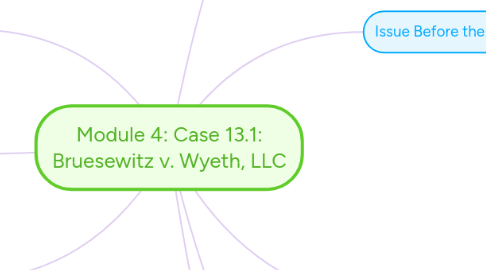
1. Impact of the Decision
1.1. Set a precedent that stabilized both the pharmaceutical industry as it relates to vaccines while offering a compensation program for those adversely effected.
2. WHY?
2.1. Pharmaceutical Companies are a for profit business and will not participate in markets where the litigation and tort costs potentially outweigh the benefit of research, development and bringing a new drug to market (vaccines)
3. Two Current Business Practices
3.1. Pharmaceutical companies are currently working on a vaccine for the Zika virus
3.2. Constant research relating to HIV and other diseases that are potentially deadly
4. Facts
4.1. Parties
4.1.1. Hannah Bruesewitz
4.1.2. Wyeth, LLC a subsidiary of Pfizer, Inc
4.2. What Happened
4.2.1. Hannah Bruesewitz was administered a dose of the DTP vaccine according to the CDC at the age of six months old. She started experiencing seizures within 24 hours and would continue to suffer up to one hundred seizures within the next month.
4.2.2. Hannah's parents filed a claim for relief in U.S. Court of Federal Claims under the National Childhood Vaccine Injury Act, which was denied.
4.2.3. They then filed a suit in a state court against Wyeth, LLC, alleging product liability.
4.2.4. They then filed a suit in a state court against Wyeth, LLC, alleging product liability.
4.3. Procedural History
4.3.1. The state court moved the case to federal district court, which held the claim was preempted by the NCVIA, which protexts manufacturers from side effects relating to vaccinations.
4.3.1.1. Determined that the 2006 law altered the competitive balance to favor Massachusetts's wineries and disfavor out-of-state competition by deisgn
5. Issue Before the Court
5.1. The issue before the court is whether or not Bruesewitz is entitled to compensation under the National Childhood Vaccine Injury Act (NCVIA)
5.2. Another issue at hand is whether or not Wyeth can be held responsible for Product Liability in the state or federal court.
6. Rule of Law
6.1. Strict Liability / Liability without Fault
6.1.1. A person who engages in certain activities can be held responsible for any harm that results to others, even if the person used the utmost care
6.1.1.1. Massive increase in vaccine-related tort litigation destabilized the market
6.1.1.1.1. Congress enacted the NCVIA, which established a no-fault compensation program which worked faster and easier than civil tort system
6.1.1.1.2. Designed to stabilize the vaccination market and prevent drug manufacturers from withdrawing due to expensive litigation
6.2. Public Policy
6.2.1. Consumes should be protected against unsafe products
6.2.2. Manufacturerers and distributors should not escape liability for faulty products simply because they are not in privity of contract with the ultimate user of those products
6.2.3. Manufacturers and distributors can better bear the costs associated with injuries caused by their products--because they can ultimately pass the costs on to all consumers in the form of higher prices
7. Application
7.1. Claim for relief to the NCVIA was denied
7.2. Suit Filed in state court alleging strict product liability
7.2.1. This cases was moved to federal court, which held claim was preempted by the NCVIA, which included provisions protecting manufacturers of vaccines for adverse side effects.
8. Conclusion
8.1. The U.S. Court of Appeals for the Third Circuit affirmed the district court's judgement
8.1.1. The court found that the NCVIA's compensation program creates a balance between compensating victims and stabilizing the industry
